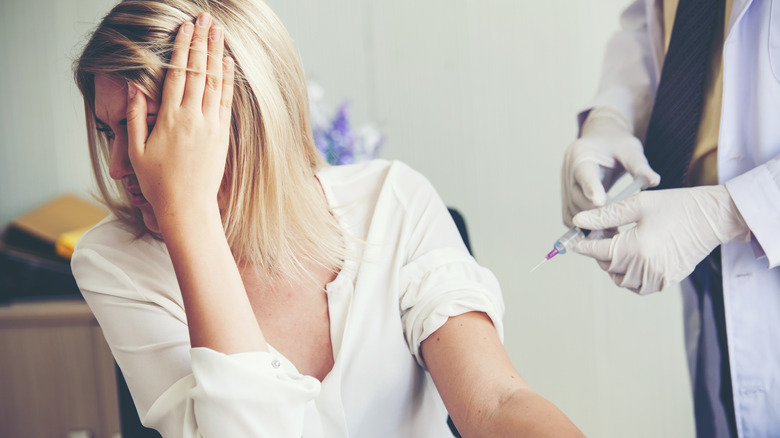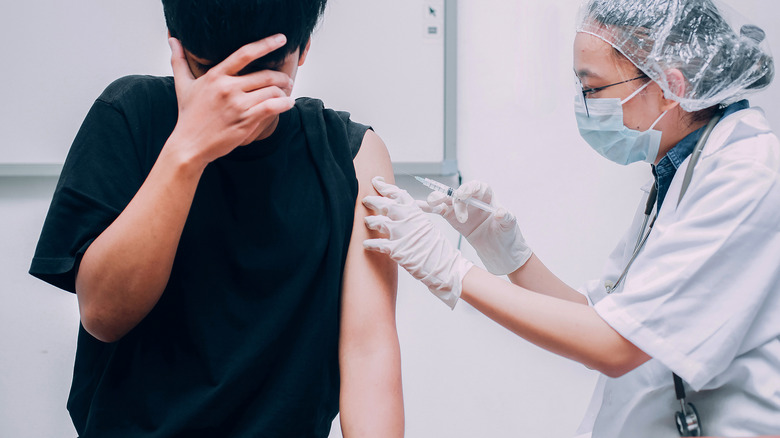If the mere mention or thought of having a blood test makes you feel queasy, you’re not alone. The fear of needles is surprisingly common and estimated to affect between 3.5% and 10% of the general population (via SAGE Open Nursing). In the medical world, the condition is also known as “trypanophobia”, the fear of injections, or “belonephobia”, which is essentially a fear of needles and pins. Sometimes it’s referred to as “aichmophobia”, although this term more accurately describes a general fear of sharp, pointed objects.
People with a needle or injection phobia have an extreme fear of hypodermic needles, to the extent that it can disrupt their life, per SAGE Open Nursing. Despite its prevalence, the disorder wasn’t officially recognized as a phobia by the Diagnostic and Statistical Manual of Mental Disorders until 1994 (via Journal of Family Practice).
While it’s natural for people to have some trepidation about getting an injection, an excessive fear of needles can be highly distressing, notes SAGE Open Nursing. It can even take a toll on an individual’s physical and mental health. Read on to learn more about the possible root causes of this complex phenomenon.
The symptoms of a needle phobia

Like most psychological phenomena, a fear of needles exists on a spectrum. This can range from mild and manageable feelings of nervousness to an overwhelming sense of anxiety and dread (via SAGE Open Nursing). Symptoms usually occur when an individual is about to have an injection or undergo a procedure that involves needles. Some people start to feel anxious when they see or think about a needle.
People can experience needle-related distress in very different ways. In many phobias, the sight of a feared object can set the heart racing and even cause heart palpitations or full-on panic attacks, notes SAGE Open Nursing. With a needle phobia, many people experience an initial rise in heart rate and blood pressure, which almost immediately plummet. This can lead to diminished blood flow to the brain, causing a person to faint, which is known as a “vasovagal syncope reaction”.
Other physical symptoms include light-headedness, sweating, and blurred vision (via British Journal of Anaesthesia). Some people may experience dizziness and nausea, adds the Cleveland Clinic.
In order for a clinical diagnosis of a needle phobia to be made, your symptoms must be excessive and unreasonable, according to the Centers for Disease Control and Prevention (CDC). Your anxiety might lead to avoidance behaviors or somehow interfere with your day-to-day functioning.
How might a needle phobia affect you?

A dislike of needles may seem fairly commonplace and reasonable, but for those who are dealing with a phobia, it can have significant and even life-threatening repercussions. For instance, people have been known to refuse life-saving treatment (per British Journal of Anaesthesia). Some individuals are so afraid that they’d rather die than subject themselves to getting an injection (via Journal of Family Practice).
The anxiety around needles can prevent people from attending important appointments or undergoing medical procedures, notes the Cleveland Clinic. Some people forgo their vaccinations, even if it puts their health at risk, while others avoid seeking medical help or visiting their doctor out of fear that they could be required to have an injection or give blood. Per SAGE Open Nursing, it’s common for individuals to become preoccupied with an upcoming procedure or treatment. They may not be able to stop worrying about it, which can wreak havoc on their mental health.
It can also lead to various social problems. Avoidance of blood tests and immunization can get in the way of an individual’s travel, immigration, or employment plans (via Journal of Family Practice). Given that the vasovagal syncope reaction is a common side-effect of a needle phobia, people often develop a profound fear of losing consciousness, which keeps them locked in a vicious cycle of avoidance and anxiety, notes the British Journal of Anaesthesia.
It may begin in childhood

Some researchers believe that a deep-seated aversion to needles is developed in childhood (via SAGE Open Nursing). Children are particularly fearful of needles. Fear is a normal emotional response to potentially a threatening stimulus like a sharp needle, after all. While most people become better able to tolerate needles as they get older, 22% of people carry this anxiety with them into adulthood.
A child may directly experience or witness someone else like a family member experiencing a traumatic medical procedure involving needles, points out SAGE Open Nursing. This trauma can be brought on by pain or psychological distress, causing them to associate needles with danger. Some people report that their aversion to needles stems from a fear of being controlled. These individuals may have been physically or emotionally restrained while receiving a vaccination or undergoing a procedure in the past.
It’s also been suggested that a needle phobia could be genetic, notes SAGE Open Nursing. Interestingly, around 80% of people with the condition report having a first-degree relative with the same fear. The vasovagal syncope reaction is also believed to run in families. However, most researchers acknowledge that the disorder is likely to arise from a combination of both learned and inherited factors (via Journal of Family Practice).
A possible evolutionary explanation

Studio Romantic/Shutterstock
Some psychologists believe that a fear of needles and the genetic predisposition to vasovagal syncope are rooted in evolution. It’s theorized that an encounter with a stranger holding a sharp object would have been associated with a much greater threat thousands of years ago than it is today (via SAGE Open Nursing). Fainting might have allowed an individual to escape a threatening situation. From this perspective, the vasovagal reflex might have evolved as an alternative survival response to fight, flight, or freeze, which helped ancient humans avoid potential stabbings and puncture wounds.
However, roughly 25% of needle-phobics don’t exhibit the vasovagal syncope response when faced with a needle or feared object or situation (via British Journal of Anaesthesia). It’s possible that these individuals have a different genetic makeup. Their phobia may have stemmed from a negative or traumatic experience with needles. According to a study published in the Journal of Advanced Nursing, a needle phobia is surprisingly common among people who have a chronic illness that requires frequent injections.
How to manage a needle phobia

Gatot Adri/Shutterstock
Doctors and researchers aren’t exactly sure what underlies a needle phobia, but luckily there are many different interventions that can help treat your anxiety disorder.
Many psychologists recommend cognitive-behavioral therapy (CBT) for the treatment of a specific phobia, including needle-related fear (via British Journal of Anaesthesia). This enables patients to confront and readjust any unhelpful thoughts, beliefs, and behaviors that are driving their phobia, while helping them to instill new ways of thinking about needles. Exposure therapy, which sits under the umbrella of CBT, involves exposure to needles over time. This can help you dismantle fear and let go of avoidance behaviors, gradually shifting your response to needles. Some doctors may also offer medication as a way to regulate stress and anxiety.
Distraction and hypnosis can also help effectively relieve needle‐related pain and fear, according to research (via SAGE Open Nursing). It can be helpful to learn and regularly practice relaxation methods, such as breathing exercises or visualization techniques. Although your phobia might not go away entirely, it’s possible to cultivate new coping strategies that can help you manage or lessen the physical symptoms.




